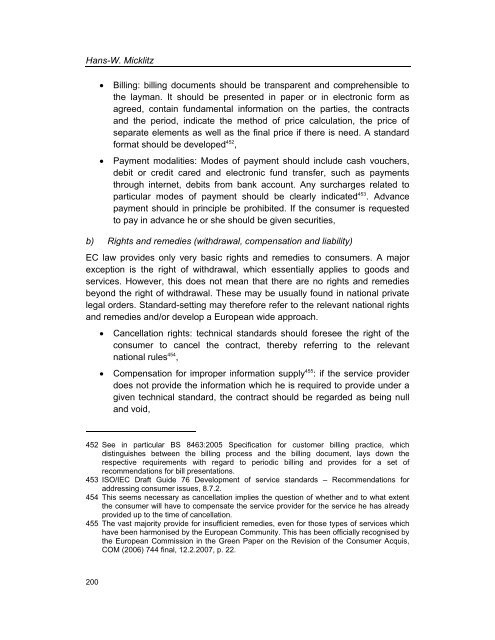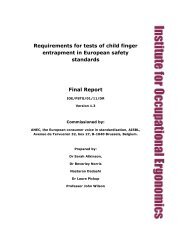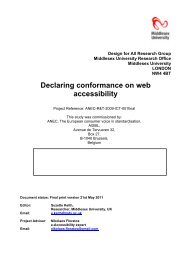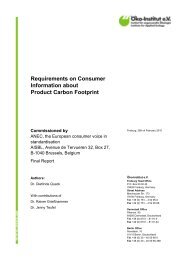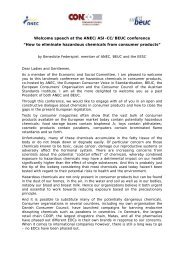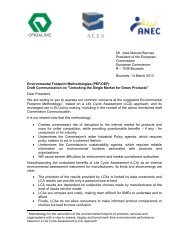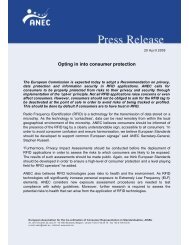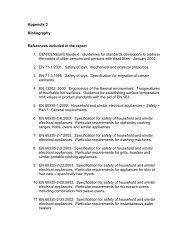Services Standards: Defining the Core Consumer Elements ... - ANEC
Services Standards: Defining the Core Consumer Elements ... - ANEC
Services Standards: Defining the Core Consumer Elements ... - ANEC
Create successful ePaper yourself
Turn your PDF publications into a flip-book with our unique Google optimized e-Paper software.
Hans-W. Micklitz<br />
• Billing: billing documents should be transparent and comprehensible to<br />
<strong>the</strong> layman. It should be presented in paper or in electronic form as<br />
agreed, contain fundamental information on <strong>the</strong> parties, <strong>the</strong> contracts<br />
and <strong>the</strong> period, indicate <strong>the</strong> method of price calculation, <strong>the</strong> price of<br />
separate elements as well as <strong>the</strong> final price if <strong>the</strong>re is need. A standard<br />
format should be developed 452 ,<br />
• Payment modalities: Modes of payment should include cash vouchers,<br />
debit or credit cared and electronic fund transfer, such as payments<br />
through internet, debits from bank account. Any surcharges related to<br />
particular modes of payment should be clearly indicated 453 . Advance<br />
payment should in principle be prohibited. If <strong>the</strong> consumer is requested<br />
to pay in advance he or she should be given securities,<br />
b) Rights and remedies (withdrawal, compensation and liability)<br />
EC law provides only very basic rights and remedies to consumers. A major<br />
exception is <strong>the</strong> right of withdrawal, which essentially applies to goods and<br />
services. However, this does not mean that <strong>the</strong>re are no rights and remedies<br />
beyond <strong>the</strong> right of withdrawal. These may be usually found in national private<br />
legal orders. Standard-setting may <strong>the</strong>refore refer to <strong>the</strong> relevant national rights<br />
and remedies and/or develop a European wide approach.<br />
• Cancellation rights: technical standards should foresee <strong>the</strong> right of <strong>the</strong><br />
consumer to cancel <strong>the</strong> contract, <strong>the</strong>reby referring to <strong>the</strong> relevant<br />
national rules 454 ,<br />
• Compensation for improper information supply 455 : if <strong>the</strong> service provider<br />
does not provide <strong>the</strong> information which he is required to provide under a<br />
given technical standard, <strong>the</strong> contract should be regarded as being null<br />
and void,<br />
452 See in particular BS 8463:2005 Specification for customer billing practice, which<br />
distinguishes between <strong>the</strong> billing process and <strong>the</strong> billing document, lays down <strong>the</strong><br />
respective requirements with regard to periodic billing and provides for a set of<br />
recommendations for bill presentations.<br />
453 ISO/IEC Draft Guide 76 Development of service standards – Recommendations for<br />
addressing consumer issues, 8.7.2.<br />
454 This seems necessary as cancellation implies <strong>the</strong> question of whe<strong>the</strong>r and to what extent<br />
<strong>the</strong> consumer will have to compensate <strong>the</strong> service provider for <strong>the</strong> service he has already<br />
provided up to <strong>the</strong> time of cancellation.<br />
455 The vast majority provide for insufficient remedies, even for those types of services which<br />
have been harmonised by <strong>the</strong> European Community. This has been officially recognised by<br />
<strong>the</strong> European Commission in <strong>the</strong> Green Paper on <strong>the</strong> Revision of <strong>the</strong> <strong>Consumer</strong> Acquis,<br />
COM (2006) 744 final, 12.2.2007, p. 22.<br />
200


